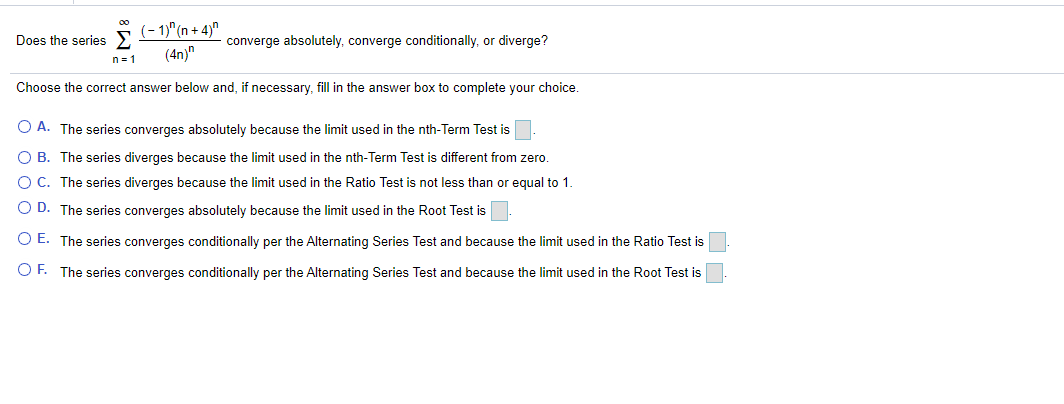(- 1)^(n + 4)^ (4n)" Does the series converge absolutely, converge conditionally, or diverge? n=1 Choose the correct answer below and, if necessary, fill in the answer box to complete your choice. O A. The series converges absolutely because the limit used in the nth-Term Test is O B. The series diverges because the limit used in the nth-Term Test is different from zero. OC. The series diverges because the limit used in the Ratio Test is not less than or equal to 1. O D. The series converges absolutely because the limit used in the Root Test is O E. The series converges conditionally per the Alternating Series Test and because the limit used in the Ratio Test is OF. The series converges conditionally per the Alternating Series Test and because the limit used in the Root Test is
(- 1)^(n + 4)^ (4n)" Does the series converge absolutely, converge conditionally, or diverge? n=1 Choose the correct answer below and, if necessary, fill in the answer box to complete your choice. O A. The series converges absolutely because the limit used in the nth-Term Test is O B. The series diverges because the limit used in the nth-Term Test is different from zero. OC. The series diverges because the limit used in the Ratio Test is not less than or equal to 1. O D. The series converges absolutely because the limit used in the Root Test is O E. The series converges conditionally per the Alternating Series Test and because the limit used in the Ratio Test is OF. The series converges conditionally per the Alternating Series Test and because the limit used in the Root Test is
Algebra & Trigonometry with Analytic Geometry
13th Edition
ISBN:9781133382119
Author:Swokowski
Publisher:Swokowski
Chapter10: Sequences, Series, And Probability
Section10.1: Infinite Sequences And Summation Notation
Problem 72E
Related questions
Question

Transcribed Image Text:00
(- 1)^(n + 4)"
(4n)"
Does the series >
converge absolutely, converge conditionally, or diverge?
n= 1
Choose the correct answer below and, if necessary, fill in the answer box to complete your choice.
O A. The series converges absolutely because the limit used in the nth-Term Test is
O B. The series diverges because the limit used in the nth-Term Test is different from zero.
O C. The series diverges because the limit used in the Ratio Test is not less than or equal to 1
O D. The series converges absolutely because the limit used in the Root Test is
O E. The series converges conditionally per the Alternating Series Test and because the limit used in the Ratio Test is
O F. The series converges conditionally per the Alternating Series Test and because the limit used in the Root Test is
Expert Solution
This question has been solved!
Explore an expertly crafted, step-by-step solution for a thorough understanding of key concepts.
This is a popular solution!
Trending now
This is a popular solution!
Step by step
Solved in 3 steps

Knowledge Booster
Learn more about
Need a deep-dive on the concept behind this application? Look no further. Learn more about this topic, calculus and related others by exploring similar questions and additional content below.Recommended textbooks for you

Algebra & Trigonometry with Analytic Geometry
Algebra
ISBN:
9781133382119
Author:
Swokowski
Publisher:
Cengage


Algebra & Trigonometry with Analytic Geometry
Algebra
ISBN:
9781133382119
Author:
Swokowski
Publisher:
Cengage
